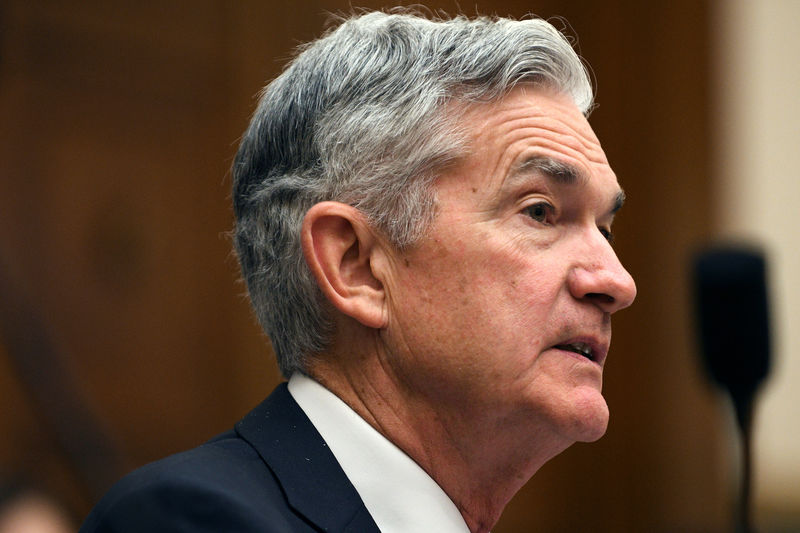By Howard Schneider and Ann Saphir
JACKSON HOLE, Wyo. (Reuters) - Federal Reserve Chairman Jerome Powell on Friday defended the U.S. central bank's push to raise interest rates as healthy for the economy and signaled more hikes were coming despite President Donald Trump's criticism of higher borrowing costs.
The Fed, which began to tighten monetary policy in 2015, has raised rates twice this year and is widely expected to do so again next month and in December.
Speaking at a research symposium in Jackson Hole, Wyoming, Powell said he wanted to "explain today why my colleagues and I believe that this gradual process ... remains appropriate."
"The economy is strong. Inflation is near our 2 percent objective, and most people who want a job are finding one ... If the strong growth in income and jobs continues, further gradual increases in the target range for the federal funds rate will likely be appropriate."
Powell made no mention of Trump's criticism of the Fed's monetary policy. In an interview with Reuters on Monday, Trump said he was "not thrilled" with Powell's Fed for raising rates and said the central bank should do more to help boost the economy.
In his speech, Powell simply made the case that gradual rate hikes are the best way to protect the U.S. economic recovery and keep job growth as strong as possible and inflation under control.
The benchmark S&P 500 index (SPX) and the Nasdaq Composite (IXIC) hit all-time highs after Powell's speech while the dollar (DXY) weakened against a basket of currencies. Traders of interest rate futures kept their bets on rate hikes in both September and December.
The Kansas City Fed's annual conference here in Grand Teton National Park is among the central bank's higher profile annual events, drawing international media attention and an audience including representatives of other nations' central banks.
Trump is "fueling the economy with fiscal stimulus and then asking that you don't tighten interest rates, but the Fed is normalizing monetary policy, not really tightening - it's accompanying the recovery and lifting rates up to the point where they are neutral," Laurence Boone, the chief economist of the OECD, said on the sidelines of the conference.
"Financial conditions are very good, and (Powell) is tightening in line with those trends," Boone said.
Antoinette Schoar, an economist who teaches at the MIT Sloan School of Management, said the Fed should remain "above the fray." "Fed policy should not have anything to do with politics," said Schoar, who is also attending the Jackson Hole conference.
NOT ON BOARD
Fed funds and eurodollar futures prices indicate financial markets expect only one rate hike next year, leaving rates in a range of 2.50 percent to 2.75 percent by mid-2019, up from the Fed's current target of 1.75 percent to 2.00 percent.
Fed policymakers forecast three rate hikes for next year in their most recent projections, published in June.
Not all of the central bank's policymakers, however, are on board with Powell's plans.
St. Louis Fed President James Bullard said earlier on Friday he'd prefer a pause on the rate hikes, given that the economic stimulus from the Trump administration's tax cuts and a budget agreement that boosts government spending will likely fade next year.
Other policymakers present in Jackson Hole this week have flagged what they see as the risks from Trump's trade policies, which have led to tit-for-tat tariffs with China, the European Union, Canada and others.
Two days of talks between Washington and Beijing ended on Thursday with no major breakthrough as their trade war escalated with activation of another round of dueling tariffs on $16 billion worth of each country's goods.
FED'S NAVIGATION
The research theme at the Jackson Hole conference this year involves change in market structure, and Powell used that topic to elaborate on why shifts in concepts like the level of "full employment" and the neutral rate of interest justify gradual rate increases.
He said the Fed's mistakes of the past, such as a misestimation of full employment that allowed inflation to take off in the 1970s, mean the central bank today should not assume its current estimates of those economic variables are precise.
The Fed "has been navigating between the shoals of overheating and premature tightening with only a hazy view of what seem to be shifting navigational guides," Powell said.
With unemployment so low, "why isn't the (Federal Open Market Committee) tightening monetary policy more sharply to head off overheating and inflation? With no clear sign of an inflation problem, why is the FOMC tightening policy at all, at the risk of choking off job growth and continued expansion?"
The resolution, he said, is to move carefully.

"I see the current path of gradually raising interest rates as the FOMC's approach to taking seriously both of these risks."